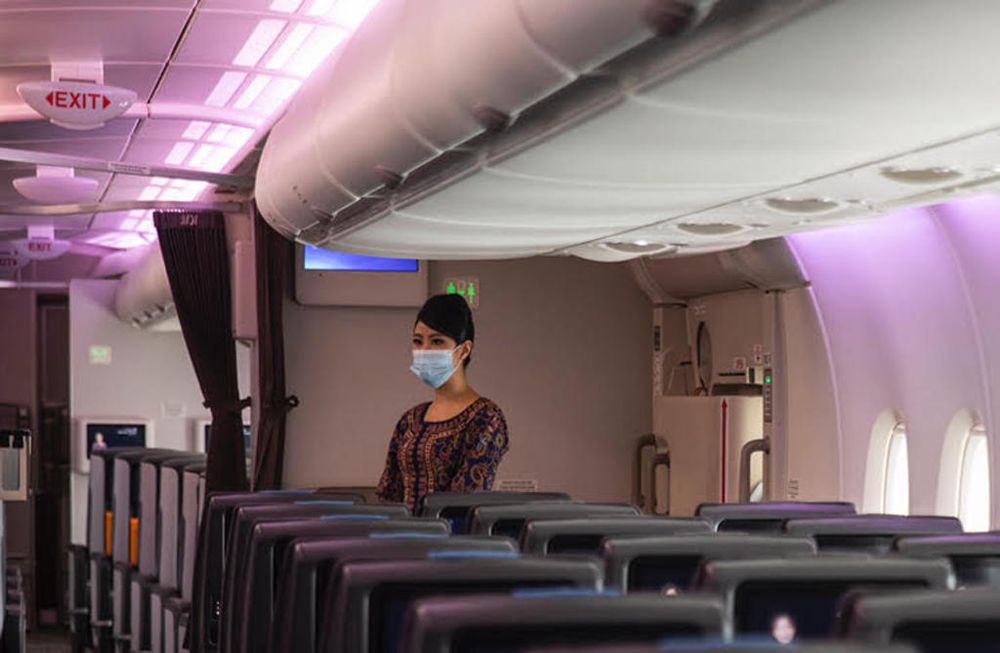Singkies are 1 fucking kind,,,SIA retrench ppl,,they KPKB,,,now flights are going to start,,,they KPKB the cabin crew will be infected,,like that dont work lah,,,
Some family members of Singapore Airlines cabin crew concerned about loved ones contracting Covid-19
Thursday, 26 Nov 2020 08:45 PM MYT
Some family members of Singapore Airlines’ cabin crew are anxious about their spouses or children catching the coronavirus while others are not so. — TODAY pic
SINGAPORE, Nov 26 — Whenever Nurzakiah Adilah’s husband, a Singapore Airlines (SIA) steward, returns from his flight duties, the young couple will make it a point not to hug or kiss each other.
“Instead, he’ll blow kisses, and the first thing he does (after returning home) is to shower and wash his clothes,” Nurzakiah, a 24-year-old homemaker, said.
As an added precaution, she leaves a sanitiser spray at the door for her 27-year-old husband, who has been with the national carrier for about five years, to disinfect his belongings before he enters the house.
Nurzakiah told TODAY that with an 18-month-old daughter, and another child on the way, they just wanted to be extra careful to prevent the potential spread of Covid-19.
This is even though no SIA cabin crew member has tested positive for the coronavirus since safe travel measures took effect in May, the Civil Aviation Authority of Singapore (CAAS) said.
ADVERTISING
While there has been no community spread of Covid-19 in more than two weeks, Singapore continues to see daily cases from people who have been travelling and entering the country.
A TODAY reader, Teo Tzu Lim, 70, recently wrote to this publication, describing how he and his wife live in constant fear that their son, an SIA steward, may get infected on a flight and pass the coronavirus to them.
Teo said that he is on long-term medication for his heart condition, and wears a mask at home until his son’s coronavirus swab tests came back negative.
He then suggested that the authorities allow SIA cabin crew to use community facilities after flight duties to protect families from Covid-19.
For Nurzakiah, she said that she does not want her husband to be quarantined at a community facility whenever he returns from his monthly flights, but she is nevertheless concerned about the possibility of infection.
“This virus is invisible and takes about two weeks before the infected shows any (symptoms),” she said.
She recognised that both SIA and the authorities are doing their best to control the spread of Covid-19, but added that her husband will receive an email or call from the Ministry of Health only a day after a passenger has been tested positive.
Tracking devices, non-centralised hotels
In response to TODAY’s queries, both CAAS and SIA said that they have implemented numerous measures to mitigate the risk of flight crew contracting the virus.
Aside from wearing protective gear and minimising interaction with passengers during flights, among other measures, they said that crew members are whisked away in chartered vehicles to accommodations far away from city centres if they have to do layovers or a stop between flights.
When this happens, crew members are required to remain in their hotels and wear tracking devices to ensure that they comply with regulations, an SIA spokesperson said.
Otherwise, crew members are required to remain on board the aircraft at their overseas destination, unless they have to carry out external safety inspections of the aircraft, CAAS said.
This will “minimise their exposure to travellers in the airport terminal”, the authority added.
For the flights that her husband takes where he does not need a swab test, Nurzakiah said that he will sleep in a separate room once home and they keep a distance from each other as much as possible within the house for about two weeks.
She said that this arrangement works for them, because even though he is unable to help to take care of their daughter, he is able to help out with the household chores.
“My pregnancy now drains my energy quickly and if my husband isn’t home, I honestly wouldn’t know how I’d get through a tough day at home alone,” she said.
She has asked her husband to find another job that does not require him to fly.
‘Not overly worried’
However, not all family members of the SIA flight crew are worried about their loved ones getting infected or passing on the virus.
A 35-year-old tutor who gave the initials of her name as SR said that she was aware of all the “substantial” precautions put in place to keep her 34-year-old steward husband safe.
He has been flying with SIA for eight years and she did not want to be identified fully because of concerns that her husband will get into trouble with the employer.
“(The risk of getting Covid-19) is very minute. It’s not zero, but it’s not substantial enough for me to feel overly worried,” the wife said.
Reverend Jason Lam, 59, whose 27-year-old stewardess daughter has worked with SIA for five years, was initially worried for her safety but felt reassured when he was informed of the precautions the airline has taken.
“Our Government... is doing its best as far as I can see. I’m not concerned, all in all,” he said. — TODAY

